Ella Guru
Ella Guru (born May 24, 1966) is an American painter and musician living in Hastings, East Sussex, England. She was a member of Mambo Taxi and the Voodoo Queens. In 1999, she became one of the founding members of the Stuckist art movement.
Ella Guru | |
|---|---|
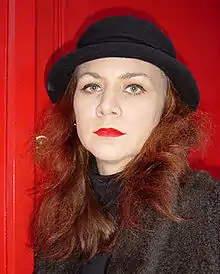 Photo of Ella Guru by Charles Thomson | |
| Born | Ella Drauglis May 24, 1966 Ohio, U.S. |
| Nationality | American |
| Education | Ohio State University |
| Known for | Painting |
| Movement | Stuckism |
Ella Guru | |
|---|---|
| Genres | Punk rock, riot grrrl, Britpop, garage punk, indie rock |
| Occupation(s) | Singer-Songwriter |
| Instruments | Guitar, vocals |
| Associated acts | Mambo Taxi, Voodoo Queens, Deptford Beach Babes |
Early life and education
Guru (birth name Ella Drauglis) was born in the U.S. state of Ohio.[1] She did a commercial art course at Fort Hayes Career Center (1982–84) and attended Columbus College of Art and Design (1984–86), which she left because of "all the conceptual crap".[2] She graduated in fine arts from Ohio State University (1988–89), where she received the Visual Arts Award.[2]
Career
From 1990 to 1991, Guru worked as a go-go dancer and stripper, and travelled to Africa and India, then for the next year lived an Islamic lifestyle in an Algerian household in Islington, London, where she was a waitress in a Mexican restaurant.[2] She has lived in London since this time.[1]
In 1996, she rode a bicycle to Lithuania, and met Sexton Ming in London, after borrowing his lipstick.[2]
In 1997, she worked as a web site designer.[1]
In 2001, she married Ming on a Dorset cliff top; they wore drag.[2] Her daughter Lucy was born in 2004.
She has been an habituée of fetish clubs, where she used to spank men, whom she terms "Tory politicians".[2] She had lunch in New York with Quentin Crisp, who said she was "weird".[2] Guru's pseudonym is taken from a Captain Beefheart song on the album Trout Mask Replica.
Music
In the early 1990s, Guru was a guitarist in the London-based British band, Mambo Taxi, linked with Riot Grrrl.[3] The inspiration for the band came from UK garage rock and US punk, and their sound was a mixture of garage, punk, and pop.[4] The name was a reference to the Mambo Taxi used by the heroine of the film, Women on the Verge of a Nervous Breakdown. Guru in an interview with NME’s Sam Stallard in 1992, said the name was "tacky", and "with all sorts of different things in it that sort of clash, but everything’s useful as well as fun."[5]
In late 1992, drummer Anjali Bhatia left Mambo Taxi to start the Voodoo Queens, along with Guru and others.[6] After their first concert, they were offered a Peel session by BBC DJ, John Peel. This was recorded in January 1993.[7] Other radio and TV appearances followed, including a further two Peel Sessions,[8] and a busking competition against Boyzone on Channel 4's music and arts programme Naked City. The group reached number one in the Indie chart in 1993.[2] Guru was replaced on bass guitar in 1994.[6]
She has played in The Deptford Beach Babes,[2] and also with her partner, Sexton Ming, in his band, The Tasty Ones.[1]
Later solo releases under artist name Ella Guro including various soundtracks, and other works: a few old projects, released April 1, 2006 Live Active Cultures (Assorted Fuckups 2005-2009) , accurate release date not listed 7DRL soundtrack, released June 15, 2012 Dys4ia Soundtrack, released March 9, 2012 SCRAPS, released May 15, 2013 Sounds From Problem Attic, released June 25, 2013 Crypt Worlds: Your Darkest Desires, Come True O.S.T.!!, released July 26, 2013 IT'S THE REEMIX,released December 17, 2013 E.P. YEAR ZERO, released June 2, 2015 ATOMS, released August 4, 2017 LP ZERO, released September 29, 2017
Stuckism
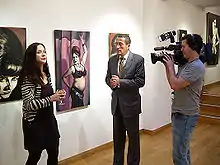
Guru started painting seriously again in 1997.[2] In 1999, she was one of the thirteen founder members[9] of the pro-figurative painting Stuckists, an anti-conceptual art and pro-figurative painting art movement founded by Charles Thomson and Billy Childish.[10] She started the Stuckist web site, stuckism.com:[11]
.jpg.webp)
Thomson said that most of the Stuckist groups made their first contact through the site and that Stuckism was "the first significant art movement to spread via the Internet."[12] In 2000, she took part in the first Stuckist demonstration against the Turner Prize at Tate Britain,[13] and has done so in later years also.[14]
In 2004, she was one of the fourteen artists in the "founder and featured" section of The Stuckists Punk Victorian show held at the Walker Art Gallery for the Liverpool Biennial.[15] In 2006, she was one of the ten "leading Stuckists"[16] in the Go West exhibition at Spectrum London gallery.
Painting
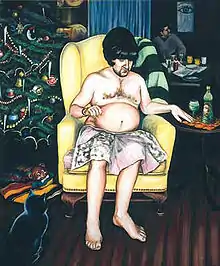
Guru has stated her concern for ability and technique, and her admiration for the work of Old Masters, although they are not necessarily her model for painting: she also appreciates untrained artists who show invention in their work.[2] She spent three years painting life models at art college, which gave her much of the grounding for her approach to art.[2]
Her paintings take anywhere between two days and two years to complete, and usually start by her "going out and getting pissed with my friends",[2] when she takes the photographs which provide the initial ideas, although the images she works from are often "very bad, dark, fuzzy photos", necessitating subsequent real life studies as well as imaginative interpretation.[2] The initial layout is done with a line drawing, but the aim is to achieve a finished result where the subject appears three-dimensional.[2] She has talked about an irrational obsession with shapes, such as those of wigs, which have always fascinated her.[2]
Her painting The Queen's Speech had its origin in Pennsylvania in the house of a friend, with whom Guru has collaborated for a number of years in setting up suitable scenes for photographs by dressing people in costume.[2] This particular scene, showing Guru's husband, Sexton Ming, was the friend's idea.[2] A photograph was the starting point for the painting, which was not started until Guru's return to London, but it was augmented by life studies and also the addition of extra items, such as the bottle of absinthe.[2]
Honors
Gallery
Some paintings by Ella Guru.
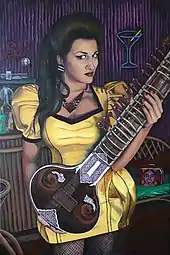 Bishi
Bishi Female Wrestlers
Female Wrestlers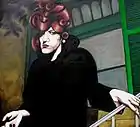 Goodbye Columbus
Goodbye Columbus The Forcibly Bewitched
The Forcibly Bewitched Fan and Snake
Fan and Snake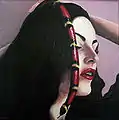 Snake 4
Snake 4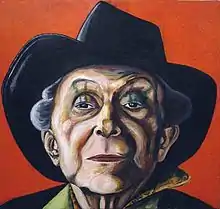

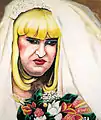 The Bride
The Bride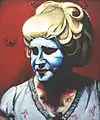 Sexton Ming with Face Pack
Sexton Ming with Face Pack
References
- Buckman, David (2006), Dictionary of Artists in Britain since 1945, p.653, Art Dictionaries, Bristol, 2006, ISBN 0-9532609-5-X
- Milner, Frank ed. (2004), The Stuckists Punk Victorian, p.68, National Museums Liverpool, ISBN 1-902700-27-9. See also excerpt on National Museums Liverpool web site.
- Mavis Bayton, "Frock rock: women performing popular music", Oxford University Press, 1998, ISBN 0-19-816615-X
- Mason, Stewart. Biography of Mambo Taxi at AllMusic
- Stallard, Sam. "Cab Happy", NME, late 1992.
- Strong, Martin C. (2003). "Voodoo Queens", in The Great Indie Discography, Canongate, ISBN 1-84195-335-0.
- "Peel sessions: 10/01/1993 - Voodoo Queens", BBC. Retrieved 19 September 2009.
- "Keeping it Peel: Voodoo Queens", BBC. Retrieved 19 September 2009.
- "Introduction", Stuckism.com. Retrieved 16 September 2009.
- "Glossary: Stuckism", Tate. Retrieved 16 September 2009.
- Thomson, Charles, "A Stuckist on Stuckism" in: Milner, Frank, ed. The Stuckists Punk Victorian, p.7, National Museums Liverpool 2004, ISBN 1-902700-27-9. Essay available online at stuckism.com.
- Thomson, Charles, "A Stuckist on Stuckism" in: Milner, Frank, ed. The Stuckists Punk Victorian, p.9, National Museums Liverpool 2004, ISBN 1-902700-27-9. Essay available online at stuckism.com.
- "Turner Prize demo 2000", Stuckism.com. Retrieved 19 September 2009.
- See links from "Index of Stuckist demos" on Stuckism.com for further details.
- "The Stuckists Punk Victorian", Walker Art Gallery, National Museums Liverpool. Retrieved 6 April 2008.
- "Go West", The Daily Telegraph. Retrieved 29 March 2008.
- Prudames, David. "The Real Turner Prize 2002", Culture 24. Retrieved 19 September 2009.
- "Pure Rawk Awards 2015 winners announced!". Purerawk.com. Retrieved September 18, 2020.
Further reading
- Evans, Katherine (2000). The Stuckists. Victoria Press. ISBN 0-907165-27-3.
External links
| Wikimedia Commons has media related to Ella Guru. |
